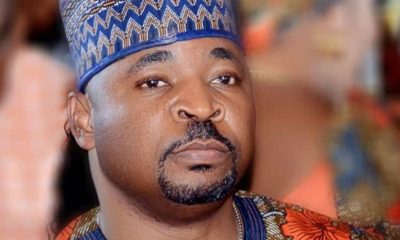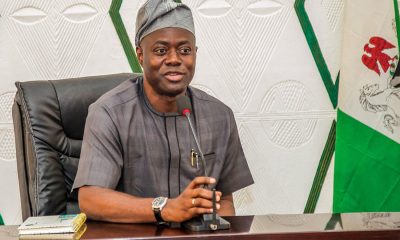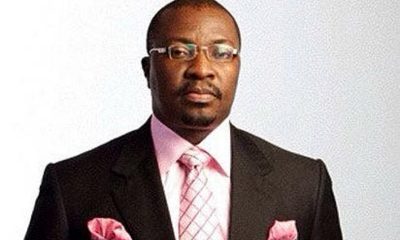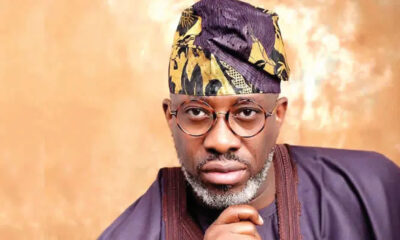Africa
Senegal begins voting for new president

Senegal begins voting for new president
Senegal began voting Sunday for a new president in an unpredictable race following three years of turmoil and political crisis.
Around 7.3 million voters are registered in the West African nation where two favourites have emerged: the governing coalition’s former prime minister Amadou Ba and anti-establishment candidate Bassirou Diomaye Faye.
They were both once tax inspectors but now appear to have little in common. Ba, 62, is offering continuity while the 43-year-old Faye promises profound change and left-wing pan-Africanism.
Both say they will claim a first-round victory – but a second round looks probable with 15 other candidates in the field, including a sole woman, at a date yet to be decided.
Former Dakar mayor Khalifa Sall, 68, is considered to have an outside chance.
“It’s a symbolic and historic day for me because it wasn’t easy to hold these elections, it was gained through a great fight,” voter Mohamed Bop, 42, told AFP in Dakar.
“So, I’m very relieved and proud,” he added.
The eventual winner will be tasked with steering traditionally stable Senegal out of its recent troubles, and managing revenues from oil and gas reserves that are shortly to start production.
READ ALSO:
- PSC seeks punishment for Imo, Delta CPs over killing of policemen
- Delta Killings: Military relaxes siege on 2 Delta communities, shifts focus to Ughoroturo village
- Why women must always check their partner’s phone – Solomon Buchi
Voting will end at 1800 GMT and provisional results could be known overnight. The first official results are expected during the coming week.
Senegal has traditionally been considered a beacon of democracy and stability in the coup-hit region, where Russia is strengthening its influence.
Raucous campaign
Hundreds of observers will be out representing civil society, the African Union, the ECOWAS regional group and the European Union.
A raucous campaign, lasting just two weeks after being shortened, followed a dramatic last-minute delay to the election date, originally scheduled for February 25.
President Macky Sall’s intervention to delay the presidential vote sparked unrest that left four people dead.
Sall, who won praise abroad last year by renouncing a possible third-term bid, said he called off the vote over fears it would not go smoothly.
After weeks of political crisis, the country’s top constitutional body stepped in and forced him to reset the date to March 24, despite clashing with the Muslim fasting month of Ramadan.
Sall’s hand-picked would-be successor Ba has positioned himself as a last bastion against “bandits” and urged people to vote “for experience and competence instead of entrusting the reins of the country to adventurers”.
“We don’t need officials who need two years of apprenticeship,” Ba said at his final campaign rally on Friday.
“We need to consolidate what we have. We need to go even faster and further,” he said, with a vow to create one million jobs in five years.
But he must also face the darker side of Sall’s legacy that includes mass arrests, persistent poverty and 20 percent unemployment, and thousands of migrants setting off on the perilous voyage to Europe each year.
Senegal begins voting for new president
Africa
Over 120 inmates escape prison in Chad shoot-out

Over 120 inmates escape prison in Chad shoot-out
No fewer than 120 inmates escaped a Chad prison during a shoot-out that left three people dead and wounded a state governor visiting the facility, officials told AFP.
The breakout occurred late Friday when an uprising happened in the high-security penitentiary five kilometres (three miles) from the town of Mongo, in the centre of Chad.
“There are around 100 who escaped, three dead and three wounded,” Hassan Souleymane Adam, secretary general of the Guera province in which Mongo is located, said.
READ ALSO:
- China warns countries against trade dealings with US
- Breaking: Pope Francis dies at 88 – Vatican
- Nigerian banks generated N14tn from loans – Report
- How Nigerian hotelier died during wife’s 60th birthday celebration
A local Mongo official, speaking to AFP on condition of anonymity, disclosed that prisoners broke into a manager’s office to steal guns.
“A shootout with guards ensued at the same time the governor arrived. He was wounded,” he said.
The Mongo official confirmed there were three killed and a total number of 132 prisoners escaped.
He disclosed that the prisoners revolted after complaining about a lack of food.
In a telephone chat with AFP, Chad’s Justice Minister Youssouf Tom stated that he was about to fly to the region and would be able to give “precise information once I am at Mongo in the coming hours.”
Over 120 inmates escape prison in Chad shoot-out
Africa
DR Congo boat fire kills 143 passengers

DR Congo boat fire kills 143 passengers
No fewer than 143 people died, and dozens more went missing after a boat carrying fuel caught fire and capsized in the Democratic Republic of Congo, officials said Friday.
Hundreds of passengers were jammed onto a wooden boat on the Congo River in northwest DRC on Tuesday when the wildfire broke out, according to Josephine-Pacifique Lokumu, head of a delegation of national MPs from the region.
The calamity struck near Mbandaka, the capital of Equateur Province, at the junction of the Ruki and the massive Congo River, the world’s deepest.
“A first group of 131 bodies was found on Wednesday, with a further 12 fished out on Thursday and Friday. Several of them are charred,” Lokumu told AFP.
According to Joseph Lokondo, a local civil society activist who helped bury the remains, the “provisional death toll is 145: some burnt, others drowned”.
According to Lokumu, the blaze was triggered by a fuel explosion sparked by an onboard cooking fire.
“A woman lit the embers for cooking. The fuel, which was not far away, exploded, killing many children and women,” she said.
READ ALSO:
- Speed Darlington alleges use of ‘Juju’ by Portable during celebrity boxing bout
- Speed Darlington alleges use of ‘Juju’ by Portable during celebrity boxing bout
- Davido eyes Nollywood, to invest in film projects
Videos circulating on social media showed flames leaping from a big boat stranded far from shore, smoke rising from the wreckage, and passengers on smaller vessels watching on.
The precise number of passengers on board the tragic vessel was unknown, but Lokumu estimated it to be in the “hundreds”.
Some people were rescued and admitted to the hospital, Lokondo added.
However, he said that “several families were still without news of their loved ones” on Friday.
The Democratic Republic of the Congo (DRC), a huge Central African nation spanning 2.3 million square kilometres (900,000 square miles), suffers from a shortage of passable roads, and planes serve just a few cities and villages.
As a result, people frequently travel on lakes, the Congo River (Africa’s second longest river after the Nile), and its winding tributaries, where shipwrecks are common and mortality tolls are high.
The persistent lack of passenger lists frequently hinders search activities.
In October 2023, at least 47 people perished when a boat travelling the Congo sank in Equateur.
According to local authorities, a boat sank on Lake Kivu in eastern DR Congo in October of last year, killing more than 20 persons.
Another shipwreck on Lake Kivu killed approximately 100 lives in 2019.
DR Congo boat fire kills 143 passengers
Africa
Niger Republic adopts Hausa as national language

Niger Republic adopts Hausa as national language
In a significant cultural shift, Niger’s military-led government has officially designated Hausa as the country’s national language, marking a break from the nation’s colonial legacy where French held prominence.
The announcement was made in a new national charter released on March 31, as published in a special edition of the government’s official journal.
According to the document, “The national language is Hausa,” and “the working languages are English and French.”
Hausa is already widely spoken across Niger, especially in the regions of Zinder, Maradi, and Tahoua. With an estimated population of 26 million, the majority of Nigeriens speak Hausa, while only about 13 percent—roughly three million people—are fluent in French.
Alongside Hausa, the charter also officially recognizes nine other indigenous languages, including Zarma-Songhay, Fula, Kanuri, Gourmanche, and Arabic, as “the spoken languages of Niger.”
READ ALSO:
- EU approves 1st retaliatory tariffs on U.S. imports
- Israeli strikes kill 20 in fresh attack on Gaza
- Nigeria spends over $21,000 to train one doctor — Health Minister
This language policy change follows a national consultative meeting held in February, during which the junta gained increased support. The assembly also approved a five-year extension for junta leader General Abdourahamane Tiani to remain in power.
Since the coup that ousted civilian president Mohamed Bazoum in July 2023, the military government has taken steps to sever ties with France. These include expelling French troops, cutting diplomatic relations, and renaming roads and public buildings previously named in French.
Niger’s move mirrors similar actions taken by fellow former French colonies Mali and Burkina Faso—both under military rule—as they too distance themselves from France and its institutions.
All three countries have also withdrawn from the Organisation Internationale de la Francophonie, a body that promotes the French language and cultural ties among member nations.
Niger Republic adopts Hausa as national language
-

 International2 days ago
International2 days agoBreaking: Pope Francis dies at 88 – Vatican
-

 metro1 day ago
metro1 day agoBring your children to compete with mine, MC Oluomo challenges those mocking his spoken English
-

 metro2 days ago
metro2 days agoHow Nigerian hotelier died during wife’s 60th birthday celebration
-

 Politics3 days ago
Politics3 days agoMalami, others in CPC started plotting against Tinubu in 2024 — Obono-Obla
-

 metro17 hours ago
metro17 hours agoRivers: Tinubu meets with Fubara, may lift his suspension
-

 Business1 day ago
Business1 day agoMarketers count losses as NNPC slashes petrol price
-

 metro2 days ago
metro2 days agoAnsar-Ud-Deen Society of Nigeria elects new leaders, Tinubu praises educational contributions
-

 News2 days ago
News2 days agoTinubu returns to Nigeria after France, UK trip













